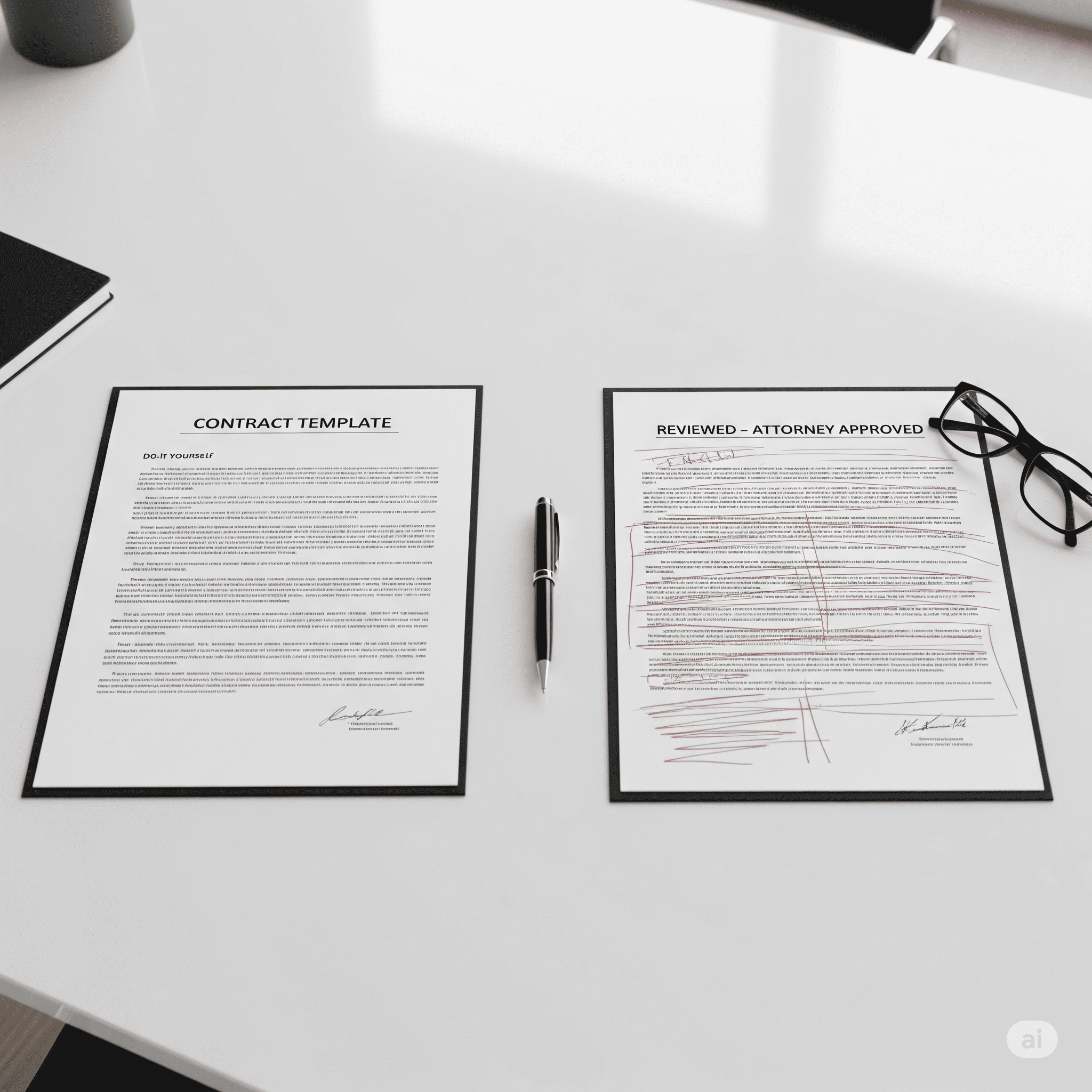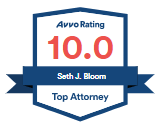Can I Use a Template for a Business Contract?

Is it safe to use a contract template I found online?
If you’re starting or running a business in Louisiana, chances are you’ve asked this question at some point: Can I just use a contract template instead of hiring a lawyer? With so many forms available online — employment contracts, NDAs, service agreements, lease templates — it’s tempting to copy, paste, and move on.
But here’s the problem: most of those templates weren’t built for your business, your industry, or Louisiana’s legal system. What looks like a simple solution could turn into a major liability — especially if you’re doing business in New Orleans, Metairie, or Jefferson Parish, where local laws and business practices can vary.
In this blog, we’ll break down when templates can work, when they’re risky, and how a local attorney through Bloom Legal Network can help you avoid contract disasters before they happen.
The False Promise of Contract Templates
Templates are popular for a reason: they are fast and cheap. For a new entrepreneur in St. Charles Parish or a small café owner in St. Tammany Parish, hiring a lawyer for every new agreement might feel like an unnecessary expense. The temptation to simply fill in the blanks is strong.
But the real purpose of a business contract is not just to “check a box.” It’s a foundational legal document designed to protect your assets, define business relationships, and mitigate long-term risk.
What Generic Templates Miss in Louisiana Law
Most online contract templates are written for common law jurisdictions, not Louisiana’s unique civil law system. This fundamental difference means that a contract that is legally valid in, say, California, may be unenforceable or interpreted differently in a Louisiana court.
Key areas where templates often fail include:
- Vague or Missing Language: Templates use broad terms that might not hold up in court. For example, a generic NDA may not clearly define “confidential information” or specify remedies under the Louisiana Uniform Trade Secrets Act.
- Outdated Clauses: Legal regulations change. A template from a few years ago might not reflect current Louisiana case law, leading to a contract that is legally obsolete.
- Lack of Industry Specificity: Your business has unique needs. A template can’t account for industry-specific regulations, licensing requirements, or standard practices that are crucial for a valid agreement.
- Improper Jurisdiction: Many templates include boilerplate clauses that assign jurisdiction to a court in a different state, forcing you to travel and hire a new attorney if a dispute arises.
📍 A contract is an enforceable promise. If it’s unclear, incomplete, or written for the wrong legal system, you have very little leverage when things go wrong.
When a Template Might Be a Starting Point (But Never the Final Product)
In a few, limited cases, a template can serve as a guide—but it must always be reviewed by a qualified attorney. This might be acceptable for:
- Low-risk, short-term agreements between parties who have an existing, trusting relationship.
- Situations where you have a strong understanding of all legal terms and can confidently customize the document.
- An initial draft that you fully intend to have a lawyer review, edit, and tailor to your specific needs.
Even for a simple, one-off project in New Orleans, an attorney’s review can help you avoid major pitfalls by ensuring crucial clauses on payment, scope, intellectual property, and dispute resolution are legally sound.
Bloom Legal Network can connect you with business attorneys who offer strategic contract reviews, helping you catch red flags before they become costly legal battles.
Common Contract Disasters Caused by Templates in Louisiana
Let’s look at three critical business documents where a DIY approach is particularly risky:
- Employment Agreements: Louisiana is an “at-will” employment state, but a poorly written employment contract can accidentally create an “implied contract,” giving employees more rights than intended. A generic template may also fail to include enforceable non-compete or confidentiality clauses that comply with Louisiana’s specific requirements.
- LLC Operating Agreements: The most common disputes among business partners stem from a poorly drafted or non-existent operating agreement. Templates often miss critical details on profit distribution, buy-sell provisions, and management authority—issues that are especially complex for family-owned or multi-partner businesses in Metairie or Jefferson Parish.
- Commercial Leases: A commercial lease is a significant financial commitment. Using a national template can leave out essential clauses regarding liability, maintenance, and subleasing that are specific to Louisiana’s property and lease laws.
The True Cost of a Bad Contract: Litigation and Lost Opportunity
The biggest risk of using a generic template isn’t just that it’s “not perfect”—it’s that it can lead to expensive and time-consuming litigation. A bad contract often fails to:
- Clearly define responsibilities and expectations.
- Establish what constitutes a breach of the agreement.
- Include proper dispute resolution clauses to avoid court.
- Protect your intellectual property.
Litigation isn’t just about legal fees; it’s about lost time, damaged business relationships, and immense stress. A well-drafted contract is a proactive measure that prevents these issues by anticipating what can go wrong and providing a clear, legally sound path forward.
So, What’s the Right Approach?
Think of a template as a starting point—like an outline for an essay. It can provide structure, but it should never be the final submission.
For a contract to truly protect your business and its future, it must be customized to reflect:
- The specific nature of your business and the deal you are making.
- The unique risks involved.
- The realities of Louisiana’s civil law system.
- Your long-term business goals.
That’s where Bloom Legal Network can help.
📞 Have questions about a contract you’re using or reviewing? Call us at 504-599-9997 or
📧 Email info@bloomlegal.com to get connected with a local attorney who knows what to look for—and how to protect your business.
Frequently Asked Questions
Yes, it still matters. Even if both parties “agree,” a contract that’s vague or inconsistent may not hold up in court — especially in Louisiana’s civil law system, which interprets contracts differently than common law states. Plus, if a dispute arises later, poorly written terms could be misread or unenforceable. A well-drafted contract protects both parties, not just the one who drafted it.
Technically, yes — but without a strong legal foundation, you may end up creating more risk than protection. Self-drafted contracts often miss key language around liability, indemnification, governing law, and enforcement mechanisms. If you’re doing business in places like St. Tammany Parish or Jefferson Parish, you’ll want your agreements to reflect local regulations and business norms. Even if you start with a draft, a legal review is highly recommended.
Up front, a template may seem cheaper — but if a dispute arises due to vague or invalid language, the cost of fixing the problem (through litigation or renegotiation) can far exceed the savings. A properly drafted or reviewed contract by a local Louisiana attorney can help you avoid expensive surprises later. Think of it as an investment in long-term business stability.






